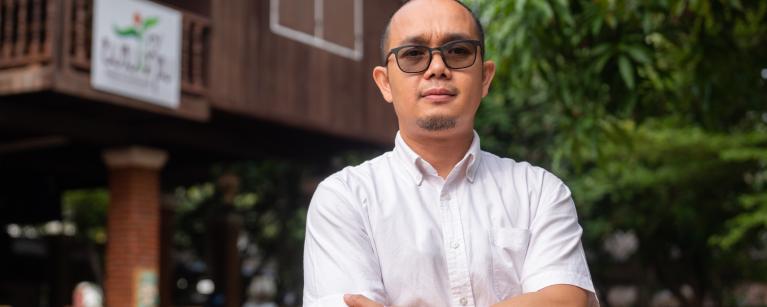SOLAR Project: Kolaka Bouanedaoheuang Phan-Thin Social Enterprise empowers youth to develop communities through soft skills training

Kolaka Bouanedaoheuang Phan-Thin Social Enterprise empowers youth to develop communities through soft skills training
In the heart of the Lao People’s Democratic Republic, the Phan Thin Social Enterprise (PTSE) is making waves by empowering young people and communities through comprehensive soft skills training. Founded in 2018 by a group of ambitious youth, the non profit organization aims to equip individuals with the necessary tools to become leaders in their communities, thereby fostering growth and development.
The name “Phan-Thin” holds a special meaning in Lao culture. “Phan” symbolizes a seedling, while “thin” represents regions and communities. Together, they signify PTSE’s mission to nurture and cultivate the potential within each individual and community. According to Kolaka Bouanedaoheuang, Director of PTSE, by recognizing the unique perspectives and innovative ideas that young people bring, the organization focuses its efforts on empowering youth to drive change within their communities. By providing training in areas such as leadership, community development, media and information literacy, finance, and organizational development, PTSE is working to create a new generation of community developers.
PTSE’s initiatives span across four provinces in the Lao People’s Democratic Republic, and the organization tailors their training programmes to the specific needs of each region and covers topics as diverse as farm and non-farm production processes, collective bargaining, essential work skills, social security, and equality of gender and labour rights. For instance, in Xieng Khuang and Salavan provinces, PTSE provides training on cultivation and husbandry techniques for farmers. In Bolikhamxay, the focus is on developing handicraft skills; while in Vientiane Capital, activities that centre around environmental protection are prioritized.
One of the key strategies employed by PTSE is to help farmers form groups and democratically elect their leaders. This approach fosters a sense of ownership and responsibility among the participants. Funding for these initiatives comes from partnerships with international organizations and international NGOs such as Oxfam and with initiatives like the SOLAR Project, which is funded by the European Union and implemented by the ILO and Oxfam. Kolaka said that he and his team have witnessed firsthand how young people are quick to develop products and access market opportunities. One inspiring example he noted is the Nam Beng village group, which consists primarily of youth members. This group successfully opened a coffee shop in the main town in Lao Ngam district and even won the prestigious Best Lao Coffee award for 2022–23.
Engaging farmers in remote areas can be challenging due to their adherence to traditional practices that have been practised for centuries. But PTSE believes in the power of participation by a range of stakeholders, including Lao Women’s Union members, labour organizations, social welfare agencies, agricultural departments, village communities and farmers themselves. By involving everyone in the planning, design and evaluation process, PTSE fosters understanding and interest among farmers. Kolaka acknowledges the difficulties involved in capturing the interest of young people, but emphasizes the importance of doing so. He explains that by helping them recognize the value of the resources at their disposal and by encouraging the production of high-quality products like coffee and tea, their incomes can improve significantly.
The Nam Beng village group is a shining example of how PTSE’s efforts can have positive flow on effects that go beyond the initial participants. Starting with just a few members, their success attracted more participants and inspired other groups to follow. Their journey showcases the transformative power of PTSE’s soft skills training in enabling individuals to create positive change within their communities.
Through their dedication and commitment to nurturing young leaders and providing essential skills training, PTSE is sowing the seeds of progress and development throughout the region.